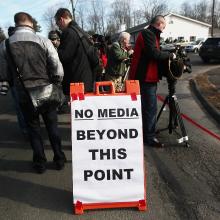news coverage
It is the norm for Western media outlets to silence and ignore the voices of Palestinians. Israel set up a blockade against Gaza beginning in 2007 in response to Hamas’ taking over the territory. By restricting the movement of goods and people in and out of the territory, Israel has created a humanitarian crisis in Gaza. Israel has attempted to justify this blockade and the ensuing humanitarian crisis by characterizing Gazans specifically, and Palestinians in general, as “terrorists” — a characterization of Palestinians that is also prevalent in the United States.
In the time following our latest national tragedy in Newtown, Conn., many have wondered where God was in the midst of these horrific events. While such questions are indeed significant and deserve extended consideration (and thankfully, many have already addressed the subject), instead of wondering where God was, perhaps the time is upon us to also consider where we are.
While it is imperative to contemplate and debate the role and presence of God during such catastrophes, it is also critical to consider our collective response as a human community.
We often learn of tragic events through the lenses of news media, and of course, the various outlets possess mixed motives and results. While there is nothing inherently wrong with sharing the stories, there is fine line between seeking facts and invading privacy, and this boundary is too often crossed. In the hours immediately following the recent shootings in Connecticut, countless camera crews, photographers, and reporters crowded around devastated children and traumatized families. While some merely wished to share information and build awareness, others seemed to be more interested in ratings and profit. And so, while the debates surrounding media ethics in the aftermath of tragedy will surely continue, most would agree that even the most sensitive of camera crews, photographers, and reporters do not always create the most ideal setting for those enduring tragedy. For the sake of those who experience loss in the most heartbreaking of circumstances, we should demand something better.

